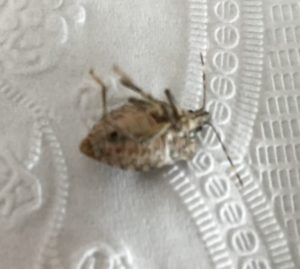Hello Fellow Readers,
During a recent interview with BJ Ward of Warren County Community College in Washington NJ regarding their upcoming visit with Liz Gilbert, he asked if stink bugs are a common garden dilemma question. As a matter of fact, no one yet asked about the annoying little buggers. BJ explained he takes them outside rather than flush them which is kind. I did too, until I learned how devastating they are to crops.
Typically stink bugs try to take up residence in the fall to overwinter. It’s true once they are inside they hibernate, but warmth can cause them to become active. Recently I woke to a stink bug on the ceiling above my head. Daylight was just breaking; there was more time to snooze. Instead, I kept one eyeball on the invader to be sure he didn’t plop on my face. Rise and shine!
Swarms in the thousands can cover a house, particularly if the façade is light in color. They make their way in through nooks and crannies of windows, doors, soffits, and chimneys. Thankfully they don’t lay eggs once inside which is a good thing as each female can lay 400 eggs twice a year; more often in warmer climates. Some say their pheromones when touched, crushed or while mating that gives the brown marmorated stink bug its common name smells like coriander – a spice many folks favor, but not in the stench of an unwelcome invader.
Stink bugs (Halyomorpha halys), native to China, Japan, Korea and Taiwan, came ashore in packing material and were first documented to be found in Allentown PA in 1998. Since then, they’ve become a serious agricultural pest. They suck fluids out of plants which leads to leaf destruction, deformed seeds, dimpling on fruits causing rotting, and mealy textured vegetables and fruits. Their fast reproduction, wide range of what they eat, limited predators, and resistance to insecticides make them especially problematic; wreaking havoc to tomatoes, peppers, apples, peaches, corn, green beans and soybeans to name a few. And, their feeding encourages the spread of pathogens causing disease.
For homeowners, mechanical exclusion is the best prevention; a fancy way of saying sealing the places stink bugs can enter. If swarms make their way inside, sucking them up with a vacuum is the best remedy. A few here and there can be flushed which sounds cruel. No more than sending them back outside in freezing temps or sucking them up I suppose.
I joked with BJ and asked if he releases ticks outside too. He doesn’t. Good thing. While stink bugs don’t bite humans, it brings a question. At what point does one decide it’s time to drop compassion for a bug? I say when they can harm you or your family. Plants and crops provide a livelihood for farmers and food for our families. So long stink bug! It’s not nice knowing you. Garden Dilemmas? Askmarystone@gmail.com



